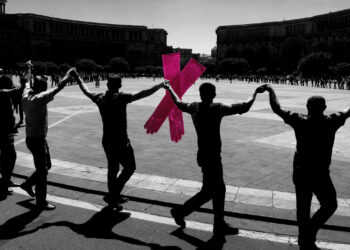Politics
Armenia’s New Government: Who’s Who
The biographies of the new interim cabinet formed by Prime Minister Nikol Pashinyan and other appointments.
Sacral Knowledge and Occam’s Razor
Suren Manukyan writes that those inside or standing beside the regime had created an alternate, false reality and not only convincingly persuaded the highest authorities of this, but also tried to convince the citizens of Armenia to believe that deception.
The May 1 Vote Was Yet Another Watershed in the Armenian Protest Movement
Vahram Ter-Matevosyan writes about the political crisis that has gripped Armenia for three weeks now. He looks back at the special session of parliament that took place yesterday, which failed to elect a prime minister and explains why the Republicans would have served Armenia better if they had treated the matter with velvet gloves instead of an iron fist.
Is 2018 the New 1988?
In this new piece, Mikayel Zolyan writes about the similarities and differences between the 1988 Karabakh Movement and the 2018 Velvet Revolution - what it meant for people then and now and lessons to be learned.
The Necessity of Inclusive Political Institutions
Hamazasp Danielyan identifies principles for the development of the political system, highlighting the circumstances that are delaying the formation of participatory political institutions and the importance of amending the Electoral Code in light of the crisis in the country.
Children in the Hands of an Abusive Father: The Popular Movement, the RPA, and Armenia’s Constitutional Crisis
Armenia is facing its greatest challenge since independence. Nikol Pashinyan’s Velvet Revolution has left the ruling Republican Party facing a crisis of legitimacy. Nerses Kopalyan writes, “Pashinyan is not seeking to usurp the Constitutional legitimacy of Parliament, but rather, force the majority in Parliament to conform to the will of the popular movement.”
Freedom of Information is Jeopardized
One of the most effective ways for authorities to control freedom of speech is to adopt and implement laws and other legal mechanisms that try to curb the work of the media. Shushan Doydoyan takes a looks at recent amendments in the RA law that have served this purpose.
In Praise of the New Prime Minister: Serzh Sargsyan’s Achievements
Today, former president Serzh Sargsyan became Armenia's new prime minister. Dr. Nerses Kopalyan outlines Sargsyan's achievements over the ten years as president. He writes: "The most vital complexity of Sargsyan becoming PM is that it not only reinforces, but also justifies the de-moralization of the Armenian citizen."
The Last 48 Hours in Yerevan
As Armenia's parliament elected Serzh Sargsyan as Armenia's prime minister today and as tens of thousands gathered in Republic Square in protest - here is a look back on the events of the last 48 hours through the lens of photojournalist Eric Grigorian.
Civil Disobedience and Clashes in Yerevan
While parliament prepares to elect the country’s new prime minister on April 17, thousands of Armenians poured out into the streets of the capital, exercising acts of civil disobedience. Clashes with security forces led to dozens of injuries. A recap of the day’s events.












